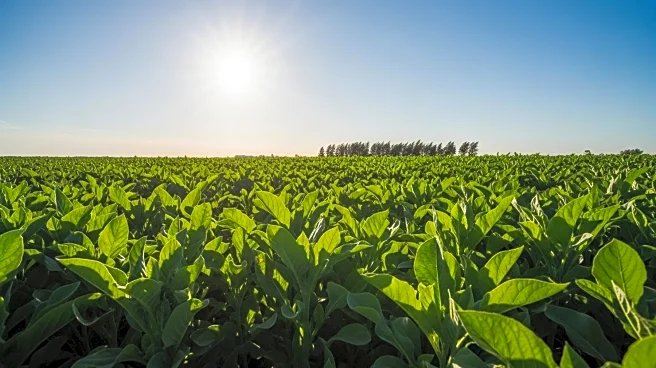What's Happening?
U.S. farmers are expressing optimism about the long-term outlook of the agricultural economy despite current economic challenges, according to a survey conducted by Purdue University and the CME Group. The Ag Economy Barometer Index rose slightly, indicating a shift in farmers' perceptions of current conditions and future expectations. The survey, conducted after the USDA's September Crop Production report, highlighted concerns over record-high corn and soybean yields affecting crop prices. Despite these pressures, farmers remain hopeful due to expectations of potential government support, such as the 2019 Market Facilitation Program, which aims to compensate for lower commodity prices. However, confidence in the positive impact of tariffs has weakened, with fewer farmers believing tariffs will strengthen the agricultural economy.
Why It's Important?
The survey results reflect a critical moment for U.S. agriculture, as farmers navigate economic pressures from high production costs and weak crop prices. The optimism about future government support is significant, as it suggests reliance on policy measures to stabilize farm incomes. The weakening confidence in tariffs indicates growing skepticism about their long-term benefits, which could influence future policy decisions. The agricultural sector's response to these challenges will impact broader economic conditions, affecting food prices and supply chains. Stakeholders, including policymakers and industry leaders, must consider these sentiments when crafting strategies to support the agricultural economy.
What's Next?
Farmers are likely to continue monitoring government actions closely, particularly regarding potential aid programs like the Market Facilitation Program. The ongoing trade tensions and tariff policies will remain a focal point, as their outcomes could significantly affect commodity prices and farm incomes. Policymakers may need to address farmers' concerns by providing clearer guidance on future support measures. Additionally, the agricultural sector may explore alternative strategies to mitigate economic pressures, such as diversifying crops or investing in technology to improve efficiency.
Beyond the Headlines
The survey results highlight deeper implications for the agricultural sector, including the potential shift in farmers' reliance on government support. This reliance raises questions about the sustainability of such aid and its impact on market dynamics. The weakening confidence in tariffs also suggests a need for reevaluating trade policies to ensure they align with farmers' interests. Long-term shifts in farmland values and economic conditions could influence investment decisions and land use patterns, affecting rural communities and the agricultural landscape.









